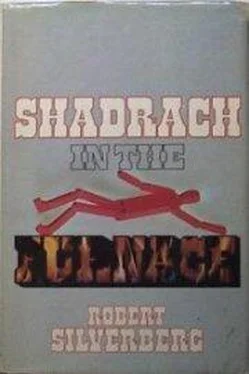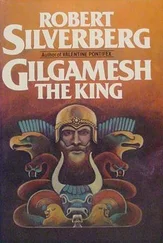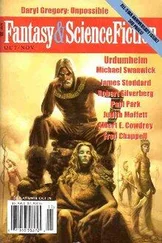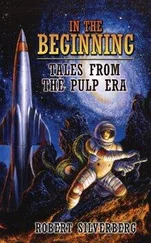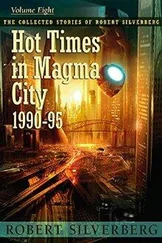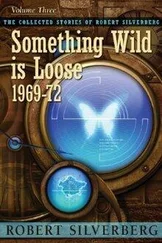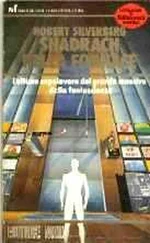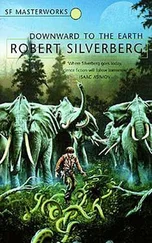Then too the organ-rot is here. Not as conspicuously as in Nairobi, perhaps, for on the broad avenues of that city the terminal cases walked alone, stumbling and lurching through private zones of vacant space. Old Jerusalem is too congested for that. But there is no scarcity of victims, shivering and sweating and groping along the Via Dolorosa. Occasionally one halts, sags against a wall, digs his fingers between the stones for support. The Stations of the Cross are indicated by marble plaques set into walls: here Jesus received the cross, here He fell the first time, here He encountered His Mother, and so on. And here, up the Via Dolorosa, go the dying, lost in their own crucifixions. As in Nairobi, they stare without seeming to see. But a few stretch their hands toward him as if imploring his blessing. This is a town where miracles have not been uncommon, and the black stranger is a man of dignity and stature: who knows, perhaps a new Savior walks these streets? But Shadrach has no miracles to offer, none. He is helpless. He is as much a dead man as they are, though he still walks about. As they do.
He feels much too conspicuous, too tall, too black, too alien, too healthy. Beggars, mostly children, cluster about him like flies. “ Dol-lar,” they implore. “ Dol-lar, dol-lar, dol-lar!” He carries no coins — he uses a government credit planchet to cover all expenses — and so there is no way he can get rid of them. He scoops one five-year-old into the air, hoping to make a piggyback ride serve in lieu of baksheesh, but the expression of terror in the child’s huge eyes is so pitiful that Shadrach quickly puts him down, and kneels, trying to give comfort. The child’s fright passes at once: “ Dol-lar,” he demands. Shadrach shrugs and the child spits at him and runs. There are too many children here, too many everywhere, unattended, running in packs through the cities of the world. They are orphans, running wild, a feral generation. Shadrach has seen Donna Labile’s demographic surveys: the worst impact of the organ-rot has fallen upon those who would now be between the ages of twenty-five and forty, Shadrach’s own contemporaries, those who were children during the Virus War. Slower to succumb than their parents were, they survived into adulthood — just long enough, most of them, to marry and bring forth young; then they died, having seeded the world with little savages. The PRC has begun to establish camps for these abandoned children, but they are not much more attractive than prisons, and the system is not working well.
It is too much for Shadrach — the fierce children, the woeful staggerers, the dirt, the unfamiliar density of the populace that throngs this tiny walled city. There is no way to escape the overwhelming sadness of the place. He should never have entered it; it would have been better by far to look out from his hotel balcony and think romantic thoughts of Solomon and Saladin. He is pushed, prodded, pawed, and elbowed; harsh-sounding things are said to him in languages he does not understand; he is beleaguered by offers to buy his clothing, to sell him jewelry, to take him on tours of the great religious sites. Without the help of guides he makes his way to the Church of the Holy Sepulchre, a grimy and graceless building, but he does not go in, for some kind of pitched battle seems to be under way at its main entrance between priests of different sects, who shout and shake fists and tug one another’s beards and shred one another’s cassocks. Turning aside, he finds, just back of the church, a busy bazaar — more accurately a flea market — where sherds and tatters of the former era are for sale: broken radios, antique television tubes, outboard engines, a miscellany of gears and wheels and cameras and electric shavers and telephones and pumps and gyroscopes and vacuum cleaners and batteries and lasers and gauges and tape recorders and calculators and microscopes and phonographs and washing machines and prisms and amplifiers, all the debris of the affluent twentieth century washed up on this strange shore. Everything is seemingly broken or defective, but the traders are doing a brisk business anyway. Shadrach is unable even to guess what uses these remnants and fragments may now be finding in the Palestinian hinterlands. He actually spies something he wants for his own medical collection, a gleaming little ultramicrotome once used to prepare tissue sections for the electron microscope, but when he produces his credit planchet rather than haggle, the trader merely gives him a blank, sullen stare. The PRC has decreed that government planchets must be accepted as legal tender everywhere, but the old Arab, after examining the glossy strip of plastic without much interest, hands it silently back to Shadrach and turns away. There is a Citpol at the edge of the marketplace who appears to be watching the aborted transaction. Shadrach could call the policeman over and get him to make the trader honor the planchet, but he decides against it; perhaps there will be unforeseeable complications, even dangers, and he does not want to attract attention in this place. He abandons the microtome and walks off to the south, through quieter streets, a residential district.
In a few minutes he comes to steps that lead downward to a great opened space, a cobblestoned plaza, at the far end of which stands an immense wall made of titanic blocks of roughhewn stone. Shadrach ambles across the plaza, heading toward the wall as he studies his map and tries to get his bearings. He remembers turning left, then left again at the Street of the Chain — perhaps he is in the old Jewish Quarter, heading back toward the Dome of the Rock and the Aqsa, in which case — “You should cover your head in this place,” says a quiet voice at his right elbow. “You stand on holy ground.”
A small compact man, seventy years old or more, tanned and vigorous-looking, has approached him. He wears a round black skullcap, and, with a courteous but insistent gesture, has produced another from his pocket which he extends toward Shadrach.
“Isn’t this whole city holy ground?” Shadrach asks, taking the skullcap.
“Every inch is holy to someone, yes. The Arabs have their places, the Copts, the Greek Orthodox, the Armenians, the Syrian Christians, everyone. But this is ours. Don’t you know the Wall?” There is no mistaking the capital letter in his voice.
“The Wall,” Shadrach says, embarrassed, staring at the great stone blocks, then at his map. “Oh. Of course. You mean this is the Wailing Wall? I didn’t realize—”
“The Western Wall, we called it, after the reconquest in 1967, when the wailing stopped for a time. Now it is the Wailing Wall again. Though I myself do not believe much in wailing, even in times such as these.” The little man smiles. “Under whatever name, it is for us Jews a holy of holies. The last remnant of the Temple.” Again the capital letter.
“Solomon’s Temple?”
“No, not that one. The Babylonians destroyed the First Temple, twenty-seven hundred years ago. This is the wall of the Second Temple, Herod’s Temple, leveled by the Romans under Titus. The Wall is all that the Romans left standing. We revere it because it is for us a symbol not only of persecution but of endurance, of survival. This is your first time in Jerusalem?”
“Yes.”
“American?”
“Yes,” Shadrach says.
“I am also. So to speak. My father brought me here when I was seven. To a kibbutz in the Galilee. Just after the proclamation of the State of Israel, you know? — in 1948. I fought in the Sinai in ’67, the Six Day War, and I was here to pray at the Wall in the first days after the victory, and I have lived in Jerusalem ever since. And the Wall to me is still the center of the world. I come here every day. Even though there is no longer really a State of Israel. Even though there are no longer any states at all, any dreams, any — ” He pauses. “Forgive me. I talk too much. Would you like to pray at the Wall?”
Читать дальше
